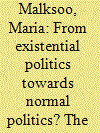| Srl | Item |
| 1 |
ID:
178578


|
|
|
|
|
| Summary/Abstract |
Whereas scholars have typically modeled climate change as a global collective action challenge, we offer a dynamic theory of climate politics based on the present and future revaluation of assets. Climate politics can be understood as a contest between owners of assets that accelerate climate change, such as fossil fuel plants, and owners of assets vulnerable to climate change, such as coastal property. To date, obstruction by “climate-forcing” asset holders has been a large barrier to effective climate policy. But as climate change and decarbonization policies proceed, holders of both climate-forcing and “climate-vulnerable” assets stand to lose some or even all of their assets' value over time, and with them, the basis of their political power. This dynamic contest between opposing interests is likely to intensify in many sites of political contestation, from the subnational to transnational levels. As it does so, climate politics will become increasingly existential, potentially reshaping political alignments within and across countries. Such shifts may further undermine the Liberal International Order (LIO); as countries develop pro-climate policies at different speeds and magnitudes, they will have incentives to diverge from existing arrangements over trade and economic integration.
|
|
|
|
|
|
|
|
|
|
|
|
|
|
|
|
| 2 |
ID:
075394


|
|
|
|
|
| Publication |
2006.
|
| Summary/Abstract |
This article presents a critical discourse analysis of the Baltic states' self-positioning within European foreign policy. It argues that, despite certain relief in their immediate security concerns after the dual enlargement of the EU and NATO, the shift from existential politics to normal politics by the Baltic states is far from being accomplished. The way in which the countries of Central and Eastern Europe (CEE) have responded to the construction of their identity as 'Europe but not Europe' throughout the enlargement processes of the EU and NATO has been largely neglected in empirical studies on their post-Cold War self-conceptualizations in the European arena. Yet, the experience of being framed as simultaneously in Europe and not quite European has left a constitutive imprint on the current security imaginary of the Baltic states. William Connolly's concept of the politics of becoming is thus applied to analyse the Baltic version of becoming a subject in the field of common European foreign policy.
|
|
|
|
|
|
|
|
|
|
|
|
|
|
|
|